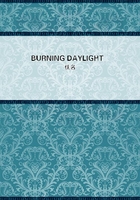
第15章
At twelve o'clock, when the sun peeped over the earth-bulge, they stopped and built a small fire on the ice. Daylight, with the ax, chopped chunks off the frozen sausage of beans. These, thawed and warmed in the frying-pan, constituted their meal. They had no coffee. He did not believe in the burning of daylight for such a luxury. The dogs stopped wrangling with one another, and looked on wistfully. Only at night did they get their pound of fish.
In the meantime they worked.
The cold snap continued. Only men of iron kept the trail at such low temperatures, and Kama and Daylight were picked men of their races. But Kama knew the other was the better man, and thus, at the start, he was himself foredoomed to defeat. Not that he slackened his effort or willingness by the slightest conscious degree, but that he was beaten by the burden he carried in his mind. His attitude toward Daylight was worshipful. Stoical, taciturn, proud of his physical prowess, he found all these qualities incarnated in his white companion. Here was one that excelled in the things worth excelling in, a man-god ready to hand, and Kama could not but worship--withal he gave no signs of it. No wonder the race of white men conquered, was his thought, when it bred men like this man. What chance had the Indian against such a dogged, enduring breed? Even the Indians did not travel at such low temperatures, and theirs was the wisdom of thousands of generations;yet here was this Daylight, from the soft Southland, harder than they, laughing at their fears, and swinging along the trail ten and twelve hours a day. And this Daylight thought that he could keep up a day's pace of thirty-three miles for sixty days! Wait till a fresh fall of snow came down, or they struck the unbroken trail or the rotten rim-ice that fringed open water.
In the meantime Kama kept the pace, never grumbling, never shirking.
Sixty-five degrees below zero is very cold. Since water freezes at thirty-two above, sixty-five below meant ninety-seven degrees below freezing-point.
Some idea of the significance of this may be gained by conceiving of an equal difference of temperature in the opposite direction. One hundred and twenty-nine on the thermometer constitutes a very hot day, yet such a temperature is but ninety-seven degrees above freezing. Double this difference, and possibly some slight conception may be gained of the cold through which Kama and Daylight travelled between dark and dark and through the dark.
Kama froze the skin on his cheek-bones, despite frequent rubbings, and the flesh turned black and sore. Also he slightly froze the edges of his lung-tissues--a dangerous thing, and the basic reason why a man should not unduly exert himself in the open at sixty-five below. But Kama never complained, and Daylight was a furnace of heat, sleeping as warmly under his six pounds of rabbit skins as the other did under twelve pounds.
On the second night, fifty more miles to the good, they camped in the vicinity of the boundary between Alaska and the Northwest Territory. The rest of the journey, save the last short stretch to Dyea, would be travelled on Canadian territory. With the hard trail, and in the absence of fresh snow, Daylight planned to make the camp of Forty Mile on the fourth night.
He told Kama as much, but on the third day the temperature began to rise, and they knew snow was not far off; for on the Yukon it must get warm in order to snow. Also, on this day, they encountered ten miles of chaotic ice-jams, where, a thousand times, they lifted the loaded sled over the huge cakes by the strength of their arms and lowered it down again. Here the dogs were well-nigh useless, and both they and the men were tried excessively by the roughness of the way. An hour's extra running that night caught up only part of the lost time.
In the morning they awoke to find ten inches of snow on their robes.